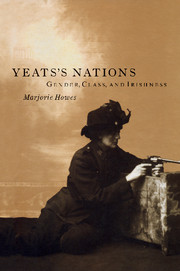Book contents
- Frontmatter
- Contents
- Acknowledgments
- List of abbreviations
- Introduction
- 1 That sweet insinuating feminine voice: hysterics, peasants, and the Celtic movement
- 2 Fair Erin as landlord: femininity and Anglo-Irish politics in The Countess Cathleen
- 3 When the mob becomes a people: nationalism and occult theatre
- 4 In the bedroom of the Big House: kindred, crisis, and Anglo-Irish nationality
- 5 Desiring women: feminine sexuality and Irish nationality in “A Woman Young and Old”
- 6 The rule of kindred: eugenics, Purgatory, and Yeats's race philosophy
- Notes
- Bibliography
- Index
2 - Fair Erin as landlord: femininity and Anglo-Irish politics in The Countess Cathleen
Published online by Cambridge University Press: 06 July 2010
- Frontmatter
- Contents
- Acknowledgments
- List of abbreviations
- Introduction
- 1 That sweet insinuating feminine voice: hysterics, peasants, and the Celtic movement
- 2 Fair Erin as landlord: femininity and Anglo-Irish politics in The Countess Cathleen
- 3 When the mob becomes a people: nationalism and occult theatre
- 4 In the bedroom of the Big House: kindred, crisis, and Anglo-Irish nationality
- 5 Desiring women: feminine sexuality and Irish nationality in “A Woman Young and Old”
- 6 The rule of kindred: eugenics, Purgatory, and Yeats's race philosophy
- Notes
- Bibliography
- Index
Summary
A nation and a woman are not forgiven the unguarded hour in which the first adventurer that came along could violate them. The riddle is not solved by such turns of speech, but merely formulated differently.
Karl MarxTradition and custom, not philosophy, are the chief defenses of property.
Standish O'GradyIn some of the Celtic writings examined in chapter i, Yeats's representations of the Irish peasantry used class – the peasant's poverty – to refigure the necessarily subordinate political status that imperial Celticists like Matthew Arnold had most commonly figured through gender. Yeats's Anglo-Irish Celticism was, in part, the cultural nationalism of a native elite who advocated national independence but did not wish to alter the existing social order and distribution of wealth significantly. Celticism's claims to being a “national” movement required that it forge an harmonious nationalist alliance between aristocrat and peasant that would maintain the social and economic divide between them rather than erasing it. In addition, it had to compete with other versions of Irish nationality, struggling to appropriate desirable tropes and signs and structure them according to its needs. Yeats's early play, The Countess Cathleen, first written while he was still deeply but ambivalently engaged with the discourse of Celticism, arranges another configuration of class, gender and nationality towards these ends. This configuration appropriates the widespread tradition of representing Ireland as a woman.
- Type
- Chapter
- Information
- Yeats's NationsGender, Class, and Irishness, pp. 44 - 65Publisher: Cambridge University PressPrint publication year: 1996



